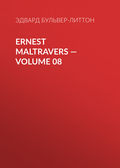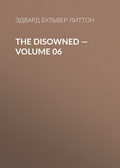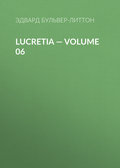
Эдвард Бульвер-Литтон
Kenelm Chillingly — Volume 01
CHAPTER XI
KENELM remained a year and a half with this distinguished preceptor. During that time he learned much in book-lore; he saw much, too, of the eminent men of the day, in literature, the law, and the senate. He saw, also, a good deal of the fashionable world. Fine ladies, who had been friends of his mother in her youth, took him up, counselled and petted him,—one in especial, the Marchioness of Glenalvon, to whom he was endeared by grateful association, for her youngest son had been a fellow-pupil of Kenelm at Merton School, and Kenelm had saved his life from drowning. The poor boy died of consumption later, and her grief for his loss made her affection for Kenelm yet more tender. Lady Glenalvon was one of the queens of the London world. Though in the fiftieth year she was still very handsome: she was also very accomplished, very clever, and very kind-hearted, as some of such queens are; just one of those women invaluable in forming the manners and elevating the character of young men destined to make a figure in after-life. But she was very angry with herself in thinking that she failed to arouse any such ambition in the heir of the Chillinglys.
It may here be said that Kenelm was not without great advantages of form and countenance. He was tall, and the youthful grace of his proportions concealed his physical strength, which was extraordinary rather from the iron texture than the bulk of his thews and sinews. His face, though it certainly lacked the roundness of youth, had a grave, sombre, haunting sort of beauty, not artistically regular, but picturesque, peculiar, with large dark expressive eyes, and a certain indescribable combination of sweetness and melancholy in his quiet smile. He never laughed audibly, but he had a quick sense of the comic, and his eye would laugh when his lips were silent. He would say queer, droll, unexpected things which passed for humour; but, save for that gleam in the eye, he could not have said them with more seeming innocence of intentional joke if he had been a monk of La Trappe looking up from the grave he was digging in order to utter "memento mori."
That face of his was a great "take in." Women thought it full of romantic sentiment; the face of one easily moved to love, and whose love would be replete alike with poetry and passion. But he remained as proof as the youthful Hippolytus to all female attraction. He delighted the Parson by keeping up his practice in athletic pursuits; and obtained a reputation at the pugilistic school, which he attended regularly, as the best gentleman boxer about town.
He made many acquaintances, but still formed no friendships. Yet every one who saw him much conceived affection for him. If he did not return that affection, he did not repel it. He was exceedingly gentle in voice and manner, and had all his father's placidity of temper: children and dogs took to him as by instinct.
On leaving Mr. Welby's, Kenelm carried to Cambridge a mind largely stocked with the new ideas that were budding into leaf. He certainly astonished the other freshmen, and occasionally puzzled the mighty Fellows of Trinity and St. John's. But he gradually withdrew himself much from general society. In fact, he was too old in mind for his years; and after having mixed in the choicest circles of a metropolis, college suppers and wine parties had little charm for him. He maintained his pugilistic renown; and on certain occasions, when some delicate undergraduate had been bullied by some gigantic bargeman, his muscular Christianity nobly developed itself. He did not do as much as he might have done in the more intellectual ways of academical distinction. Still, he was always among the first in the college examinations; he won two university prizes, and took a very creditable degree, after which he returned home, more odd, more saturnine—in short, less like other people—than when he had left Merton School. He had woven a solitude round him out of his own heart, and in that solitude he sat still and watchful as a spider sits in his web.
Whether from natural temperament or from his educational training under such teachers as Mr. Mivers, who carried out the new ideas of reform by revering nothing in the past, and Mr. Welby, who accepted the routine of the present as realistic, and pooh-poohed all visions of the future as idealistic, Kenelm's chief mental characteristic was a kind of tranquil indifferentism. It was difficult to detect in him either of those ordinary incentives to action,—vanity or ambition, the yearning for applause or the desire of power. To all female fascinations he had been hitherto star-proof. He had never experienced love, but he had read a good deal about it; and that passion seemed to him an unaccountable aberration of human reason, and an ignominious surrender of the equanimity of thought which it should be the object of masculine natures to maintain undisturbed. A very eloquent book in praise of celibacy, and entitled "The Approach to the Angels," written by that eminent Oxford scholar, Decimus Roach, had produced so remarkable an effect upon his youthful mind that, had he been a Roman Catholic, he might have become a monk. Where he most evinced ardour it was a logician's ardour for abstract truth; that is, for what he considered truth: and, as what seems truth to one man is sure to seem falsehood to some other man, this predilection of his was not without its inconveniences and dangers, as may probably be seen in the following chapter.
Meanwhile, rightly to appreciate his conduct therein, I entreat thee, O candid reader (not that any reader ever is candid), to remember that he is brimful of new ideas, which, met by a deep and hostile undercurrent of old ideas, become more provocatively billowy and surging.
CHAPTER XII
THERE had been great festivities at Exmundham, in celebration of the honour bestowed upon the world by the fact that Kenelm Chillingly had lived twenty-one years in it.
The young heir had made a speech to the assembled tenants and other admitted revellers, which had by no means added to the exhilaration of the proceedings. He spoke with a fluency and self-possession which were surprising in a youth addressing a multitude for the first time. But his speech was not cheerful.
The principal tenant on the estate, in proposing his health, had naturally referred to the long line of his ancestors. His father's merits as man and landlord had been enthusiastically commemorated; and many happy auguries for his own future career had been drawn, partly from the excellences of his parentage, partly from his own youthful promise in the honours achieved at the University.
Kenelm Chillingly in reply largely availed himself of those new ideas which were to influence the rising generation, and with which he had been rendered familiar by the journal of Mr. Mivers and the conversation of Mr. Welby.
He briefly disposed of the ancestral part of the question. He observed that it was singular to note how long any given family or, dynasty could continue to flourish in any given nook of matter in creation, without any exhibition of intellectual powers beyond those displayed by a succession of vegetable crops. "It is certainly true," he said, "that the Chillinglys have lived in this place from father to son for about a fourth part of the history of the world, since the date which Sir Isaac Newton assigns to the Deluge. But, so far as can be judged by existent records, the world has not been in any way wiser or better for their existence. They were born to eat as long as they could eat, and when they could eat no longer they died. Not that in this respect they were a whit less insignificant than the generality of their fellow-creatures. Most of us now present," continued the youthful orator, "are only born in order to die; and the chief consolation of our wounded pride in admitting this fact is in the probability that our posterity will not be of more consequence to the scheme of Nature than we ourselves are." Passing from that philosophical view of his own ancestors in particular, and of the human race in general, Kenelm Chillingly then touched with serene analysis on the eulogies lavished on his father as man and landlord.
"As man," he said, "my father no doubt deserves all that can be said by man in favour of man. But what, at the best, is man? A crude, struggling, undeveloped embryo, of whom it is the highest attribute that he feels a vague consciousness that he is only an embryo, and cannot complete himself till he ceases to be a man; that is, until he becomes another being in another form of existence. We can praise a dog as a dog, because a dog is a completed /ens/, and not an embryo. But to praise a man as man, forgetting that he is only a germ out of which a form wholly different is ultimately to spring, is equally opposed to Scriptural belief in his present crudity and imperfection, and to psychological or metaphysical examination of a mental construction evidently designed for purposes that he can never fulfil as man. That my father is an embryo not more incomplete than any present is quite true; but that, you will see on reflection, is saying very little on his behalf. Even in the boasted physical formation of us men, you are aware that the best-shaped amongst us, according to the last scientific discoveries, is only a development of some hideous hairy animal, such as a gorilla; and the ancestral gorilla itself had its own aboriginal forefather in a small marine animal shaped like a two-necked bottle. The probability is that, some day or other, we shall be exterminated by a new development of species.
"As for the merits assigned to my father as landlord, I must respectfully dissent from the panegyrics so rashly bestowed on him. For all sound reasoners must concur in this, that the first duty of an owner of land is not to the occupiers to whom he leases it, but to the nation at large. It is his duty to see that the land yields to the community the utmost it can yield. In order to effect this object, a landlord should put up his farms to competition, exacting the highest rent he can possibly get from responsible competitors. Competitive examination is the enlightened order of the day, even in professions in which the best men would have qualities that defy examination. In agriculture, happily, the principle of competitive examination is not so hostile to the choice of the best man as it must be, for instance, in diplomacy, where a Talleyrand would be excluded for knowing no language but his own; and still more in the army, where promotion would be denied to an officer who, like Marlborough, could not spell. But in agriculture a landlord has only to inquire who can give the highest rent, having the largest capital, subject by the strictest penalties of law to the conditions of a lease dictated by the most scientific agriculturists under penalties fixed by the most cautious conveyancers. By this mode of procedure, recommended by the most liberal economists of our age,—barring those still more liberal who deny that property in land is any property at all,—by this mode of procedure, I say, a landlord does his duty to his country. He secures tenants who can produce the most to the community by their capital, tested through competitive examination in their bankers' accounts and the security they can give, and through the rigidity of covenants suggested by a Liebig and reduced into law by a Chitty. But on my father's land I see a great many tenants with little skill and less capital, ignorant of a Liebig and revolting from a Chitty, and no filial enthusiasm can induce me honestly to say that my father is a good landlord. He has preferred his affection for individuals to his duties to the community. It is not, my friends, a question whether a handful of farmers like yourselves go to the workhouse or not. It is a consumer's question. Do you produce the maximum of corn to the consumer?
"With respect to myself," continued the orator, warming as the cold he had engendered in his audience became more freezingly felt,—"with respect to myself, I do not deny that, owing to the accident of training for a very faulty and contracted course of education, I have obtained what are called 'honours' at the University of Cambridge; but you must not regard that fact as a promise of any worth in my future passage through life. Some of the most useless persons—especially narrow-minded and bigoted—have acquired far higher honours at the University than have fallen to my lot.
"I thank you no less for the civil things you have said of me and of my family; but I shall endeavour to walk to that grave to which we are all bound with a tranquil indifference as to what people may say of me in so short a journey. And the sooner, my friends, we get to our journey's end, the better our chance of escaping a great many pains, troubles, sins, and diseases. So that when I drink to your good healths, you must feel that in reality I wish you an early deliverance from the ills to which flesh is exposed, and which so generally increase with our years that good health is scarcely compatible with the decaying faculties of old age. Gentlemen, your good healths!"
CHAPTER XIII
THE morning after these birthday rejoicings, Sir Peter and Lady Chillingly held a long consultation on the peculiarities of their heir, and the best mode of instilling into his mind the expediency either of entertaining more pleasing views, or at least of professing less unpopular sentiments; compatibly of course, though they did not say it, with the new ideas that were to govern his century. Having come to an agreement on this delicate subject, they went forth, arm in arm, in search of their heir. Kenelm seldom met them at breakfast. He was an early riser, and accustomed to solitary rambles before his parents were out of bed.
The worthy pair found Kenelm seated on the banks of a trout-stream that meandered through Chillingly Park, dipping his line into the water, and yawning, with apparent relief in that operation.
"Does fishing amuse you, my boy?" said Sir Peter, heartily.
"Not in the least, sir," answered Kenelm.
"Then why do you do it?" asked Lady Chillingly.
"Because I know nothing else that amuses me more."
"Ah! that is it," said Sir Peter: "the whole secret of Kenelm's oddities is to be found in these words, my dear; he needs amusement. Voltaire says truly, 'Amusement is one of the wants of man.' And if Kenelm could be amused like other people, he would be like other people."
"In that case," said Kenelm, gravely, and extracting from the water a small but lively trout, which settled itself in Lady Chillingly's lap,—"in that case I would rather not be amused. I have no interest in the absurdities of other people. The instinct of self-preservation compels me to have some interest in my own."
"Kenelm, sir," exclaimed Lady Chillingly, with an animation into which her tranquil ladyship was very rarely betrayed, "take away that horrid damp thing! Put down your rod and attend to what your father says. Your strange conduct gives us cause of serious anxiety."
Kenelm unhooked the trout, deposited the fish in his basket, and raising his large eyes to his father's face, said, "What is there in my conduct that occasions you displeasure?"
"Not displeasure, Kenelm," said Sir Peter, kindly, "but anxiety; your mother has hit upon the right word. You see, my dear son, that it is my wish that you should distinguish yourself in the world. You might represent this county, as your ancestors have done before. I have looked forward to the proceedings of yesterday as an admirable occasion for your introduction to your future constituents. Oratory is the talent most appreciated in a free country, and why should you not be an orator? Demosthenes says that delivery, delivery, delivery, is the art of oratory; and your delivery is excellent, graceful, self-possessed, classical."
"Pardon me, my dear father, Demosthenes does not say delivery, nor action, as the word is commonly rendered; he says, 'acting, or stage-play,'—the art by which a man delivers a speech in a feigned character, whence we get the word hypocrisy. Hypocrisy, hypocrisy, hypocrisy! is, according to Demosthenes, the triple art of the orator. Do you wish me to become triply a hypocrite?"
"Kenelm, I am ashamed of you. You know as well as I do that it is only by metaphor that you can twist the word ascribed to the great Athenian into the sense of hypocrisy. But assuming it, as you say, to mean not delivery, but acting, I understand why your debut as an orator was not successful. Your delivery was excellent, your acting defective. An orator should please, conciliate, persuade, prepossess. You did the reverse of all this; and though you produced a great effect, the effect was so decidedly to your disadvantage that it would have lost you an election on any hustings in England."
"Am I to understand, my dear father," said Kenelm, in the mournful and compassionate tones with which a pious minister of the Church reproves some abandoned and hoary sinner,—"am I to understand that you would commend to your son the adoption of deliberate falsehood for the gain of a selfish advantage?"
"Deliberate falsehood! you impertinent puppy!"
"Puppy!" repeated Kenelm, not indignantly but musingly,—"puppy! a well-bred puppy takes after its parents."
Sir Peter burst out laughing.
Lady Chillingly rose with dignity, shook her gown, unfolded her parasol, and stalked away speechless.
"Now, look you, Kenelm," said Sir Peter, as soon as he had composed himself. "These quips and humours of yours are amusing enough to an eccentric man like myself, but they will not do for the world; and how at your age, and with the rare advantages you have had in an early introduction to the best intellectual society, under the guidance of a tutor acquainted with the new ideas which are to influence the conduct of statesmen, you could have made so silly a speech as you did yesterday, I cannot understand."
"My dear father, allow me to assure you that the ideas I expressed are the new ideas most in vogue,—ideas expressed in still plainer, or, if you prefer the epithet, still sillier terms than I employed. You will find them instilled into the public mind by 'The Londoner' and by most intellectual journals of a liberal character."
"Kenelm, Kenelm, such ideas would turn the world topsy-turvy."
"New ideas always do tend to turn old ideas topsy-turvy. And the world, after all, is only an idea, which is turned topsy-turvy with every successive century."
"You make me sick of the word 'ideas.' Leave off your metaphysics and study real life."
"It is real life which I did study under Mr. Welby. He is the Archimandrite of Realism. It is sham life which you wish me to study. To oblige you I am willing to commence it. I dare say it is very pleasant. Real life is not; on the contrary—dull," and Kenelm yawned again.
"Have you no young friends among your fellow-collegians?"
"Friends! certainly not, sir. But I believe I have some enemies, who answer the same purpose as friends, only they don't hurt one so much."
"Do you mean to say that you lived alone at Cambridge?"
"No, I lived a good deal with Aristophanes, and a little with Conic Sections and Hydrostatics."
"Books. Dry company."
"More innocent, at least, than moist company. Did you ever get drunk, sir?"
"Drunk!"
"I tried to do so once with the young companions whom you would commend to me as friends. I don't think I succeeded, but I woke with a headache. Real life at college abounds with headache."
"Kenelm, my boy, one thing is clear: you must travel."
"As you please, sir. Marcus Antoninus says that it is all one to a stone whether it be thrown upwards or downwards. When shall I start?"
"Very soon. Of course there are preparations to make; you should have a travelling companion. I don't mean a tutor,—you are too clever and too steady to need one,—but a pleasant, sensible, well-mannered young person of your own age."
"My own age,—male or female?"
Sir Peter tried hard to frown. The utmost he could do was to reply gravely, "FEMALE! If I said you were too steady to need a tutor, it was because you have hitherto seemed little likely to be led out of your way by female allurements. Among your other studies may I inquire if you have included that which no man has ever yet thoroughly mastered,—the study of women?"







